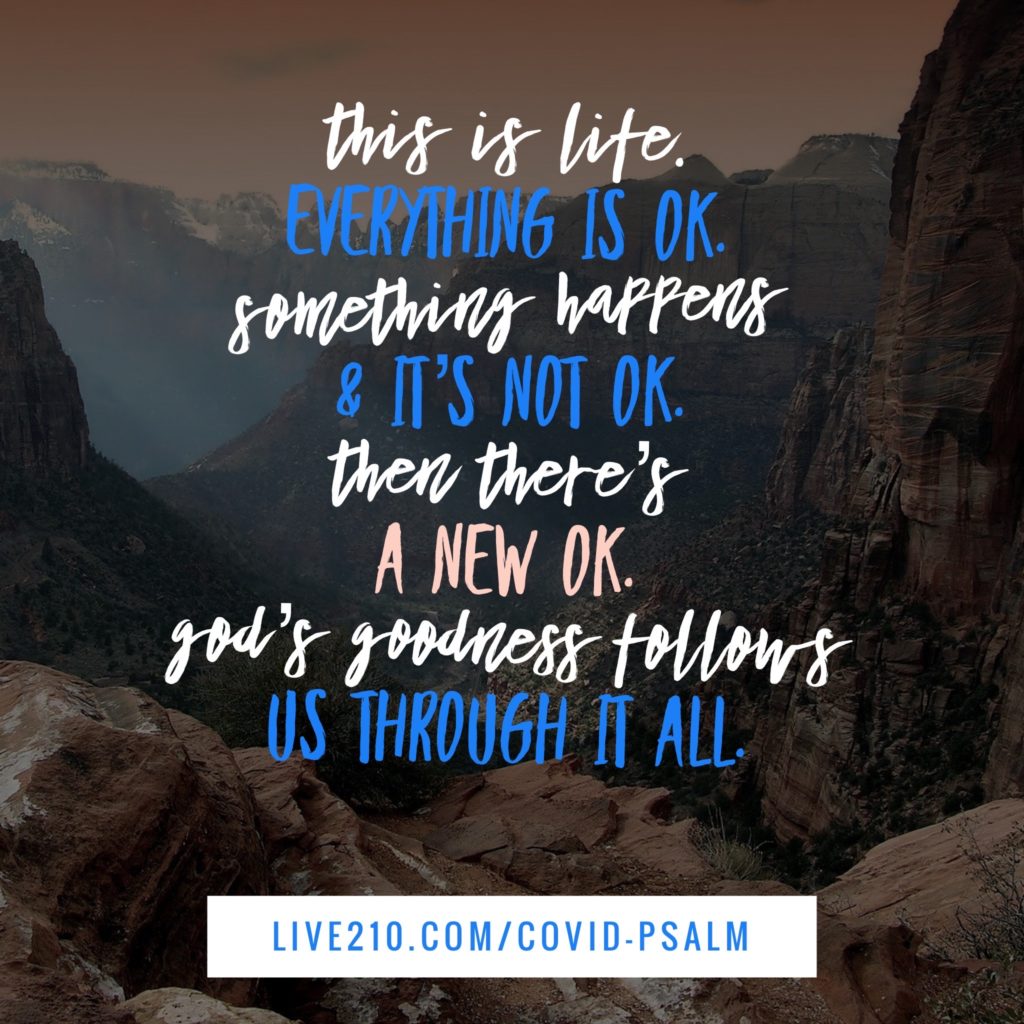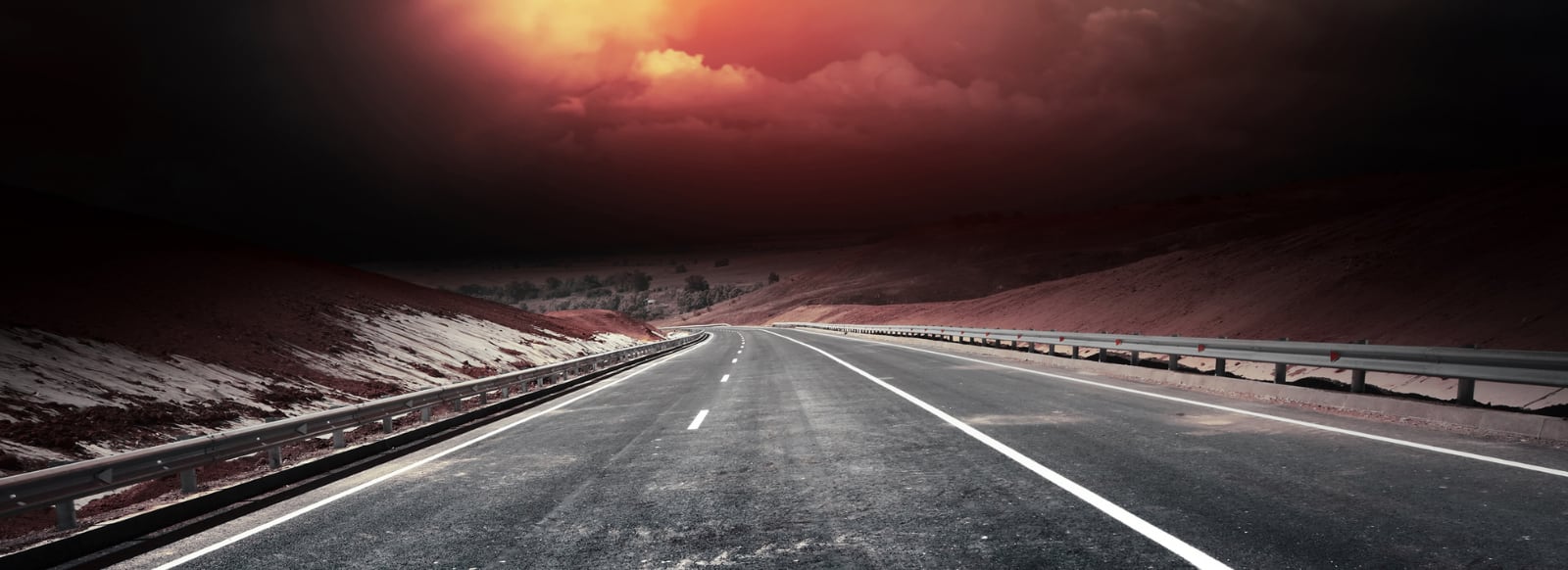6 min. to read.
At the beginning of April, I moved into my new planner for the 2nd quarter of this year. I browsed back through past appointments, projects, to-dos both completed and left undone. I was stunned at how quickly things can change.
Four months ago, life looked one way. And now? Completely different. Then I’d never heard of COVID-19. Corona was a beer. Now? This invisible pathogen has rearranged every part of our lives.
Even more confusing, this radical upheaval has all happened in a matter of weeks! That sudden shift feels like an emotional earthquake. I find myself rapidly shifting between hope and anxiety, worry and wondering.
I’m hearing people say they can’t wait until we get back to normal. This whole thing is disorienting, and we are desperate to get re-oriented. Are you feeling that way?
There is a Psalm that many people of faith turn to in times of uncertainty. You probably know it. It starts, “The Lord is my shepherd. I shall not want…”
The 23rd Psalms has practically become a mantra for Christians. Popular movies certainly treat it like one. As the beat of the music telegraphs impending danger, some priest, or the religious mother, starts reciting these well-worn lines. “Though I walk through the valley of the shadow, I will fear no evil… I will fear no evil…”
The 23rd Psalm portrays a place of comfort and safety, with everything we need, including comfort, mercy, and goodness that seems to go on forever. Who doesn’t want that?
Chanting the 23rd Psalm hoping for protection from the virus, or an economic crash can be a form of religious denial. But I think this ancient song has something more profound to offer us.
The cycle of disorientation
Walter Brueggemann is one of the foremost Old Testament scholars of our time. He’s also an expert on Hebrew poetry. He, along with most scholars, believes the Psalms are not private journal entries but are, in fact, liturgical. They were written for use in the community, as a part of gathered worship, meant to give people prayers for different circumstances.
Brueggemann categorizes these psalms as addressing three different life experiences. He identifies them this way.
There are Psalms of Orientation. Everything is going well; the usual routine is life-giving. People are content. In moments like that, Psalms of Orientation help people turn their hearts toward God in gratitude for what they have been given.
Then there are Psalms of Disorientation. Something terrible has happened. Life has become difficult, confusing, and painful. The routines and institutions we trusted are broken or have betrayed us. Psalms of Disorientation give a voice to sadness, fear, even anger, and betrayal. They help us cry out, “God, are You here? Are You even with us?”
Then there are Psalms of Reorientation. In the middle of difficult times, there has been some healing, renewal, or reconciliation. Psalms of Reorientation help people to name this, affirming God’s goodness, and helping them find a new direction together.

Life comes at you fast!
I suspect that Psalms 23 is so potent because it includes all three of these life experiences in six short verses.
The first three verses are Orientation. I have a shepherd. I have everything I need. Life is good.
But that state is interrupted! Verse 4 presents a scene of Disorientation. Suddenly I’m in a dark valley. I can’t see the way out and have no idea how long it will last. The safe green meadows are nowhere to be seen. Our former expectations of “How things are going to be” no longer apply. That’s a loss. Loss evokes grief. If the loss is outside of our control, there’s anger. We’re uncertain how to move on.
Then the Psalm turns to Reorientation. In verses 5 and 6, God prepares a safe place. There’s a table with food and drink. There’s an anointing, overflowing goodness and mercy.
But be very clear. This table is different than the meadow and stream of verse 2. That safe place we once knew is gone. Now we find ourselves at a new table, a new place to dwell. This new place of safety and provision feels, at least for the moment, like it could last forever.
We’ve seen this before.
This is life, people.
Psalms 23 shows us the whole cycle. Everything is OK. Then something happens, and it’s not OK. And then, after a season, there’s a new OK.
Once you notice this cycle, you can remember that the dark valley is not the end! It’s what ‘s true for now. But something else is more true. God’s goodness follows you through it all.
When we were younger or less mature, our eyes were only on our circumstances. We only noticed the calm meadow and clear water of verse 2 or the lack. But after living through this cycle a few times, we can remember something else.
Verse 4. “Even though I walk through the darkest valley, I will fear no evil…” But why? Because “…You are with me.” Now we can see the truth. God was with us in the green meadow. God will be with us at the table of plenty. But also—and more importantly—God is with us in the dark valley.
We are in a moment of drastic and unprecedented change. Despite our hopes, we honestly have no idea how long this will last, or what ramifications it will have for our society. For some of us, that’s terrifying.
Real comfort doesn’t come from denying any of that. We have to acknowledge the truth. This is what’s so. It’s painful. We’re uncertain. This is a dark valley.
But that is not our whole story! The cycle of life and faith is this: Orientation. Disorientation. Reorientation. This is life.
Faith is remembering that through it all, we are not alone. God was with us when things were good. God is with us in the darkness. And God will be with us in the new normal—whatever that ends up being.
There will be a table of God’s provision in the days to come.

Good Morning, Marc!
Thank you for the encouraging message about life! I gained a better understanding of the flow of my life as a result of reading! I can say it undoubtedly defines the flow of my life since I’ve been on earth!
During these ever-changing times, I’ve been working on “going with the flow” — now I have direction on that which comprises the flow: Orientation, Disorientation, Reorientation.
Thank you for your faithful service, Marc!
I’m so glad you found it helpful! I feel similarly. Two things in particular really make a difference for me. Knowing that any period of disorientation is not going to last forever—even if it feels like it. And then knowing that there will be a new “normal”, a reorientation. It won’t be the same as what we lost, but it will be OK.
Always so on point Marc. A reminder that God is with you and by your side always. Thanks for this
I hope all is well with you, Wayne! It’s a crazy time. Stay safe!